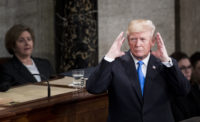A new report from the Transportation Research Board doesn't see an imminent crisis in the current U.S. system of financing road building, but it says there would be major benefits from expanded use of tolls and from other ways of matching motorists' fees more closely to how much they drive.
 |
| U.S. drivers can expect to pay more tolls. (Photo courtesy of Metropolitan Transit Commission) |
The report, The Fuel Tax and Alternatives for Transportation Funding, released Jan. 23, says that the current highway finance system, which relies mostly on gasoline and diesel fuel taxes paid to the Highway Trust Fund, should be able to cover some added road capacity and other improvements over the next 15 years. But it adds that the funding won't be enough to unclog nationwide road congestion.
Even so, the study, done by a TRB committee, says there would be significant gains "from a transition to a fee structure that more directly charged vehicle operators for their actual use of roads." That plan for what the TRB panel calls "practical reform" would include a network of toll expressways and lanes using variable prices, and a system of metering to charge motorists according to how many miles they drive and on which roads. But the study notes, "Conversion to road use metering will require a sustained national effort."
The TRB report comes as state transportation departments, construction industry officials and other highway specialists are laying the groundwork for the next major federal transportation bill. The current measure, the long-delayed SAFETEA-LU--Safe, Accountable, Flexible, Efficient Transportation Equity Act: A Legacy for Users--was signed into law just last August and expires in 2009. But highway interests already are warning that the Highway Trust Fund won't be adequate to pay for major improvements.
The trust fund's cash balance is projected to be exhausted in 2008. Federal, state and industry officials are awaiting the Treasury Dept.'s latest estimate of the fund's revenue, expected in early February.
The TRB committee doesn't discern a major trust fund disaster in the immediate future, But the panel chairman, Urban Institute Senior Fellow Rudolph G. Penner, says, "To improve highways, we should rethink the way revenues are raised instead of only increasing them."
Penner, a former director of the Congressional Budget Office, adds, "The present highway finance system can remain viable for some time, but the right reforms might give us a system that not only pays for roads, but also allows us to manage traffic flow and ensure that scarce funds are invested in projects with the greatest public benefit."
The U.S. Chamber of Commerce released a report in November that said the trust fund's annual revenue in the 2006-2015 period will fall $23 billion short of the amount needed to maintain present road and transit conditions, and be $48 billion less than the level of federal spending necessary to make improvements.
|
Penner, a former director of the Congressional Budget Office, adds, "The present highway finance system can remain viable for some time, but the right reforms might give us a system that not only pays for roads, but also allows us to manage traffic flow and ensure that scarce funds are invested in projects with the greatest public benefit."
The U.S. Chamber of Commerce released a report in November that said the trust fund's annual revenue in the 2006-2015 period will fall $23 billion short of the amount needed to maintain present road and transit conditions, and be $48 billion less than the level of federal spending necessary to make improvements.
To view the TRB report, go to www.trb.org. TRB is part of the National Academies.

